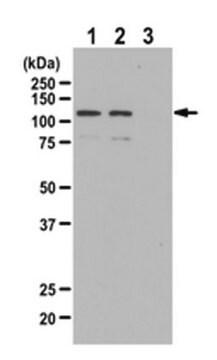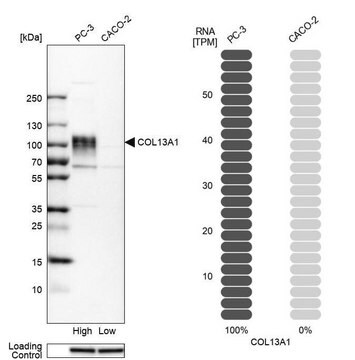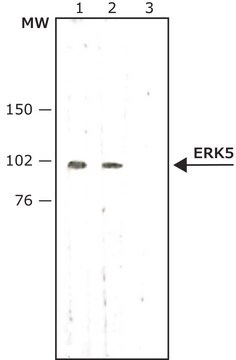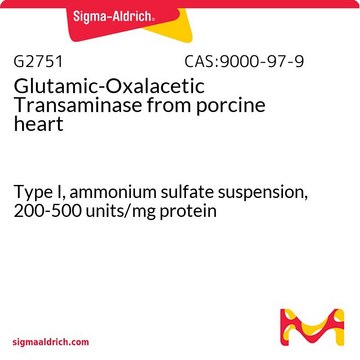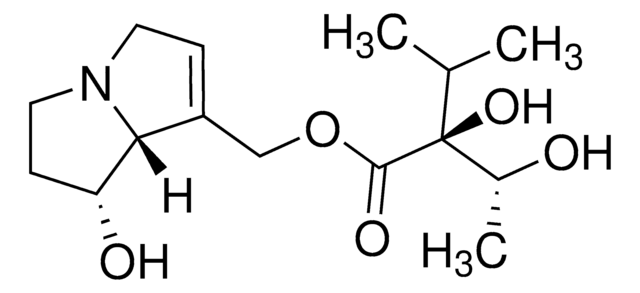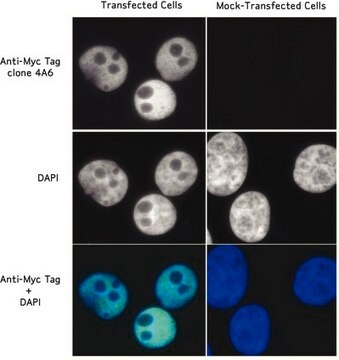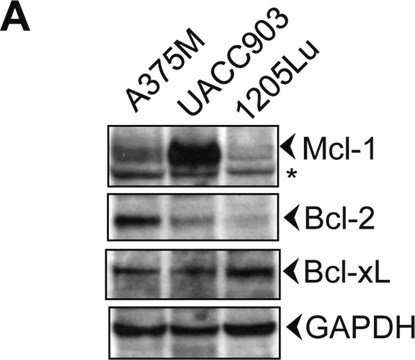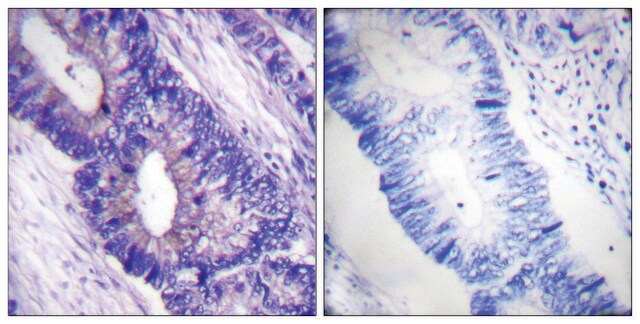E7153
Anti-phospho-ERK5 (pThr218/pTyr220) antibody produced in rabbit
affinity isolated antibody, buffered aqueous glycerol solution
Synonym(s):
Anti-BMK1
Sign Into View Organizational & Contract Pricing
All Photos(1)
About This Item
Recommended Products
biological source
rabbit
Quality Level
conjugate
unconjugated
antibody form
affinity isolated antibody
antibody product type
primary antibodies
clone
polyclonal
form
buffered aqueous glycerol solution
species reactivity
human
UniProt accession no.
shipped in
wet ice
storage temp.
−20°C
Gene Information
human ... MAPK7(5598)
General description
Extracellular Signal-Regulated Kinases (ERKs) are proteins that belong to mitogen-activated protein kinase superfamily (MAPK) and have a pivotal role in cell cycle, differentiation, transcription and learning and memory through signal transduction in the cytoplasm and the nucleus. ERK5 MAP kinase cascade has a crucial functions like- induction of special form of cardiac hypertrophy, enhanced neuronal survival and early steps of muscle cell differentiation. Anti-phospho-ERK5 (pThr218/pTyr220) antibody can be used in immunostaining. Rabbit anti- phospho-ERK5 (pThr218/pTyr220) antibody reacts specifically with ERK5 (88 kD) of human.
Immunogen
Synthetic phosphopeptide derived from the region of human ERK5 that contains threonine 218 and tyrosine 220. This sequence is conserved in human and mouse.
Application
Each vial contains enough material for 10 blots. The end user should determine the correct working dilution for their process.
Physical form
Solution in Dulbecco′s PBS, pH 7.3, with 50% glycerol, 1 mg/ml BSA and ≤ 0.1% sodium azide.
Disclaimer
Unless otherwise stated in our catalog or other company documentation accompanying the product(s), our products are intended for research use only and are not to be used for any other purpose, which includes but is not limited to, unauthorized commercial uses, in vitro diagnostic uses, ex vivo or in vivo therapeutic uses or any type of consumption or application to humans or animals.
Not finding the right product?
Try our Product Selector Tool.
Storage Class Code
10 - Combustible liquids
WGK
WGK 1
Flash Point(F)
Not applicable
Flash Point(C)
Not applicable
Personal Protective Equipment
dust mask type N95 (US), Eyeshields, Gloves
Certificates of Analysis (COA)
Search for Certificates of Analysis (COA) by entering the products Lot/Batch Number. Lot and Batch Numbers can be found on a product’s label following the words ‘Lot’ or ‘Batch’.
Already Own This Product?
Find documentation for the products that you have recently purchased in the Document Library.
A Karihaloo et al.
The Journal of biological chemistry, 276(12), 9166-9173 (2000-12-29)
Cells derived from the inner medullary collecting duct undergo in vitro branching tubulogenesis to both the c-met receptor ligand hepatocyte growth factor (HGF) as well as epidermal growth factor (EGF) receptor ligands. In contrast, many other cultured renal epithelial cells
M Janulis et al.
Molecular and cellular biology, 21(6), 2235-2247 (2001-03-10)
The proto-oncogene Raf is a major regulator of growth and differentiation. Previous studies from a number of laboratories indicate that Raf activates a signaling pathway that is independent of the classic MEK1,2-ERK1,2 cascade. However, no other signaling cascade downstream of
Rui-min Wang et al.
Neuroscience letters, 357(1), 13-16 (2004-03-24)
Activation (phosphorylation) and the possible mechanism of extracellular signal-regulated kinase 5 (ERK5) were evaluated after cerebral ischemia-reperfusion (I/R) in the hippocampus in a four-vessel occlusion model of Sprague-Dawley rats. Western blotting showed that ERK5 was strongly activated from 10 min
Rui-Min Wang et al.
Life sciences, 79(19), 1839-1846 (2006-07-25)
Accumulating evidence implicates activation (phosphorylation) of mitogen-activated protein kinases (MAPK) during nonlethal ischemic preconditioning in the protection of hippocampal CA1 neuron against subsequent ischemic events. In this paper, we undertook to identify the role of extracellular signal regulated kinase (ERK)
Li-Na Yu et al.
Pain physician, 20(4), E563-E574 (2017-05-24)
There are numerous studies implicating that EphB receptors and ephrinB ligands play important roles in modulating the transduction of spinal nociceptive information. EphrinB-EphB signaling may contribute to hyperalgesia via various kinds of downstream molecules, the mechanisms of which have not
Our team of scientists has experience in all areas of research including Life Science, Material Science, Chemical Synthesis, Chromatography, Analytical and many others.
Contact Technical Service